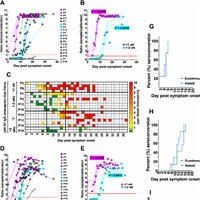Stories Category: Intensive Care

Innovations in ICU Ventilation
Many centuries ago, Socrates stated that "the secret of change is to focus all of your energy, not on fighting the old, but on building the new." Nowadays, we may relate his quote with the concept of innovation, which is... read more

Epidemiology and microbiology of ventilator-associated pneumonia in COVID-19 patients
The COVID-19 pandemic is responsible for many hospitalizations in intensive care units (ICU), with widespread use of invasive mechanical ventilation (IMV) which exposes patients to the risk of ventilator-associated pneumonia... read more

Central and peripheral nervous system complications of COVID-19
CNS and PNS complications were common in hospitalized COVID-19 patients, particularly in the ICU, and often attributable to critical illness. When COVID-19 was the primary cause for neurological disease, no signs of viral... read more

Duty of Care: One NHS Doctor’s Story of Courage and Compassion on the COVID-19 Frontline
The first book to tell the full story of the Covid-19 pandemic, from an NHS doctor working inside hospitals to save lives and combat the virus on the front line. Duty of Care is the first book to tell the full story of... read more

Effect of a Single High Dose of Vitamin D3 on Hospital LOS in Patients with COVID-19
Among hospitalized patients with COVID-19, a single high dose of vitamin D3, compared with placebo, did not significantly reduce hospital length of stay. The findings do not support the use of a high dose of vitamin D3 for... read more

The Plague Cycle: The Unending War Between Humanity and Infectious Disease
For four thousand years, the size and vitality of cities, economies, and empires were heavily determined by infection. Striking humanity in waves, the cycle of plagues set the tempo of civilizational growth and decline, since... read more

Long-Term Implications of Abnormal Left Ventricular Strain During Sepsis
Among patients with sepsis and pre-existing cardiac disease who survived to ICU discharge, left ventricular global longitudinal systolic strain demonstrated a U-shaped association with cardiovascular outcomes through 24 months.... read more

Insight into ECMO, mortality and ARDS
ARDS is a severe disease with a high mortality rate despite ECLS therapy. Although endpoints and timing of the evaluations differed from those of the CESAR and EOLIA studies and the Extracorporeal Life Support Organization... read more

The Rules of Contagion: Why Things Spread – And Why They Stop
From ideas and infections to financial crises and fake news, an "utterly timely" look at why the science of outbreaks is the science of modern life These days, whenever anything spreads, whether it's a YouTube fad or a... read more

Study finds genetic clues to pneumonia risk and COVID-19 disparities
Researchers at Vanderbilt University Medical Center and colleagues have identified genetic factors that increase the risk for developing pneumonia and its severe, life-threatening consequences. Their findings, published... read more

Human ACE2 peptide-mimics block SARS-CoV-2 pulmonary cells infection
The current pandemic originated by SARS-CoV-2 causes an unprecedented health crisis. The medical world has found itself helpless in the face of this virus, having to deal with the absence of specific effective treatment.... read more

Is chloroquine or hydroxychloroquine useful in treating people with COVID-19, or in preventing infection in people who have been exposed to the virus?
COVID-19 is an infectious respiratory disease caused by a coronavirus called SARS-CoV-2. If the infection becomes severe, people may need intensive care and support in hospital, including mechanical ventilation. Drugs... read more

Barotrauma in Mechanically-ventilated Patients with COVID-2019
Within the limits of a survey, patients with COVID-19 might be at high risk for barotrauma during invasive (and allegedly lung-protective) mechanical ventilation. The response rate was 38/61 (62%). The incidence of... read more

Temporal development and neutralising potential of antibodies against SARS-CoV-2 in hospitalised COVID-19 patients
Antibody responses are important in the control of viral respiratory infection in the human host. What is not clear for SARS-CoV-2 is how rapidly this response occurs, or when antibodies with protective capability evolve.... read more

RECOVERY trial shows tocilizumab reduces deaths in patients hospitalised with COVID-19
The NIHR-supported RECOVERY trial has shown that tocilizumab - an anti-inflammatory rheumatoid arthritis treatment - reduces the risk of death for hospitalised patients with severe COVID-19. Researchers also found that... read more

Surviving Sepsis Campaign Guidelines on the Management of Adults with COVID-19 in the ICU
The Surviving Sepsis Campaign Coronavirus Disease 2019 panel issued several recommendations to guide healthcare professionals caring for adults with critical or severe coronavirus disease 2019 in the ICU. Based on a living... read more

An Index Combining Respiratory Rate and Oxygenation to Predict Outcome of Nasal High-Flow Therapy
In patients with pneumonia with acute respiratory failure treated with high-flow nasal cannula (HFNC), ROX is an index that can help identify those patients with low and those with high risk for intubation. This was a... read more








